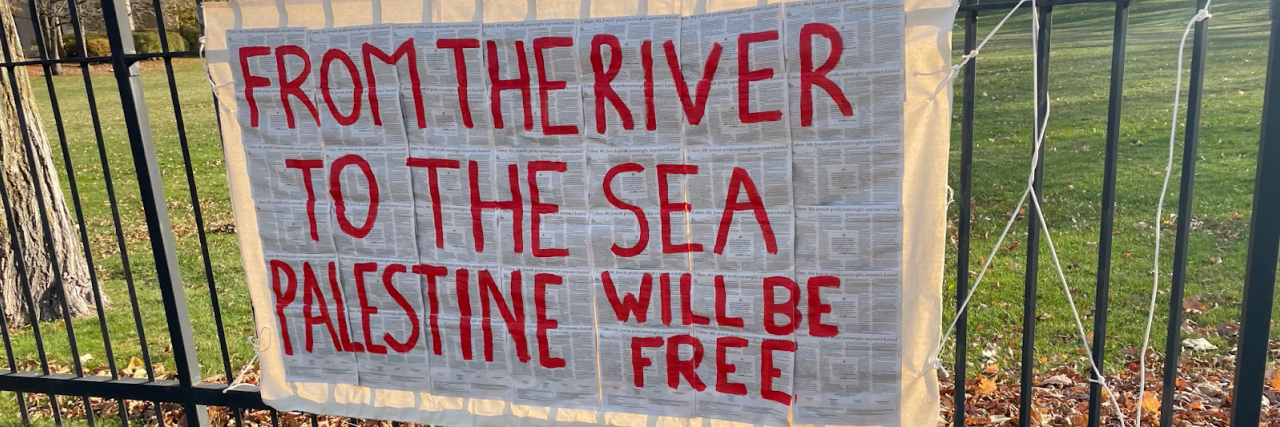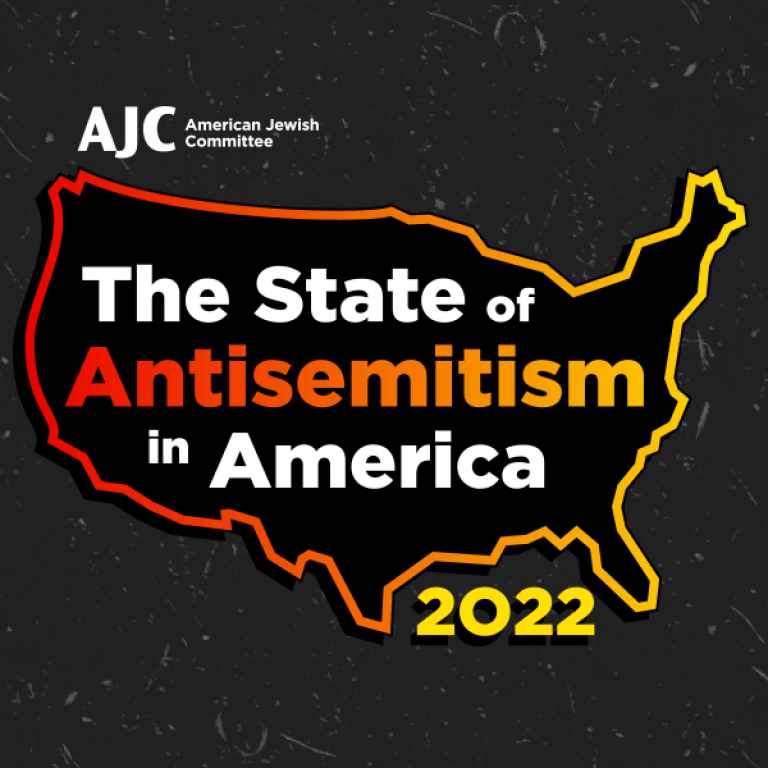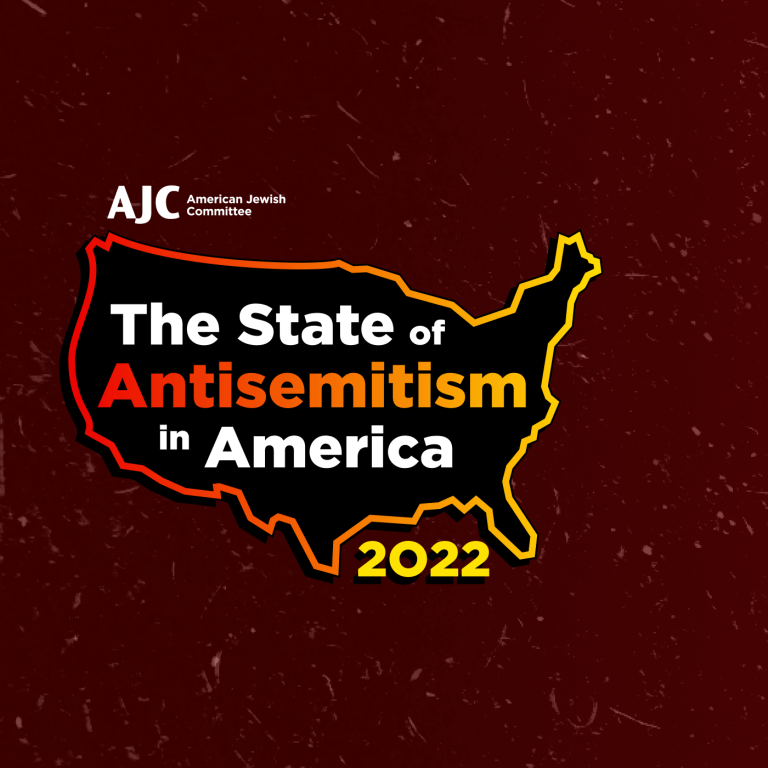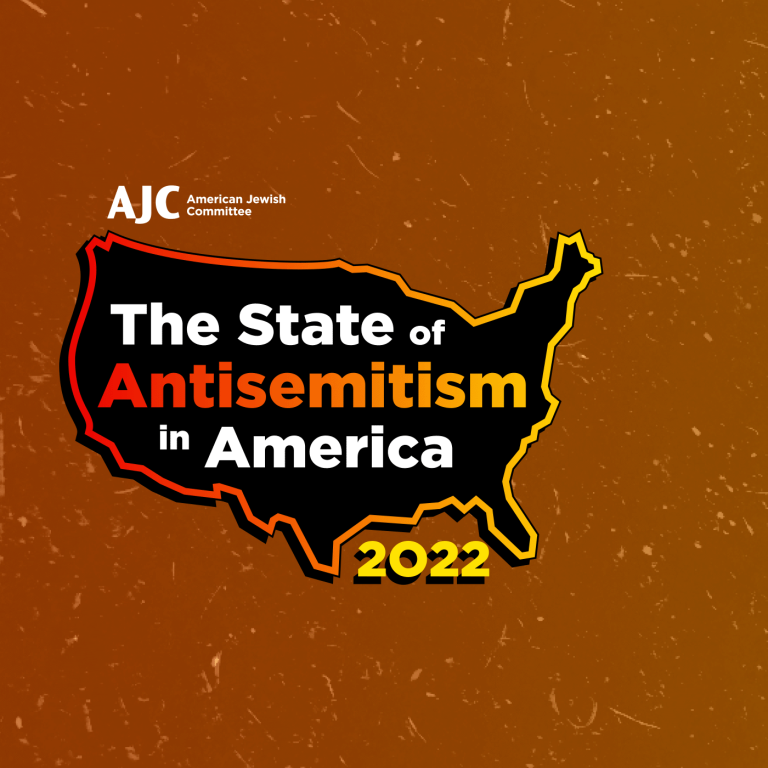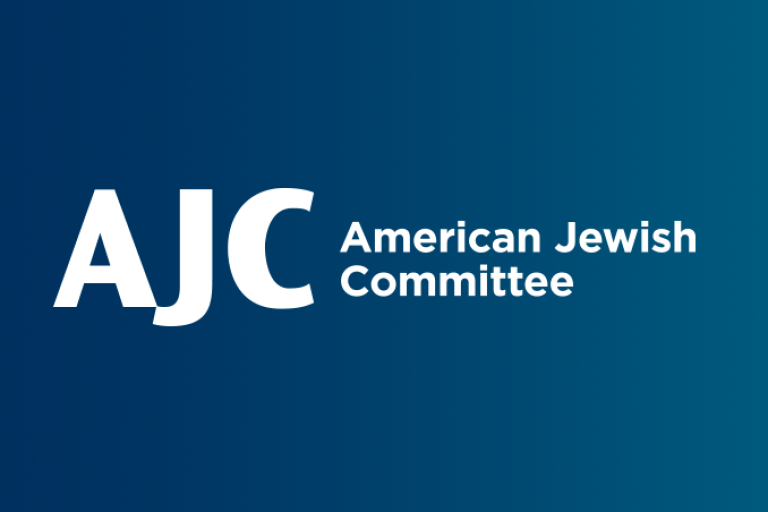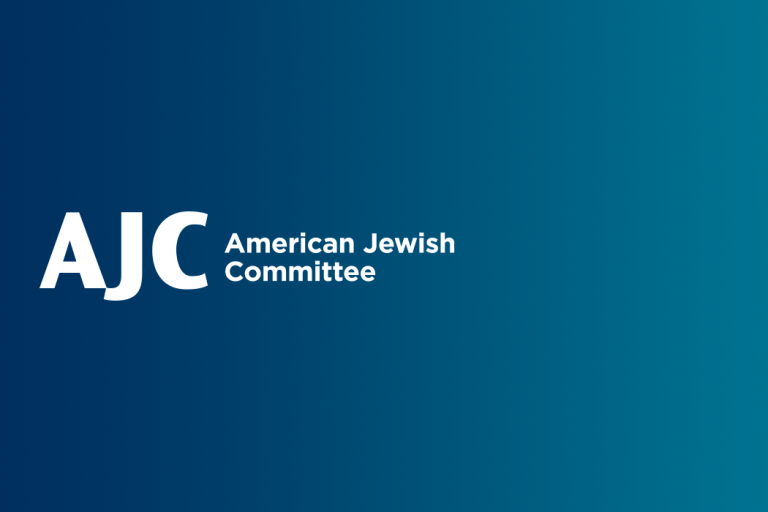February 13, 2023
College campuses have long served as laboratories for the open exchange of ideas and experiences. But the discourse on the Israel-Palestinian conflict has become increasingly challenging as antisemitic incidents increase, antisemitic tropes rooted in discussions around Israel proliferate on social media, and instructors and campus groups target Jewish students when conversations or policy discussions about the Jewish state occur. When Jewish students are harassed or socially isolated or Jewish institutions on campus are vandalized in response to actions taken by the State of Israel, that is antisemitism.
Among the many incidents in 2022, a teaching assistant at the University of Vermont publicly suggested lowering the grades of pro-Israel students; students returning to the University of Wisconsin in Madison encountered chalk messages calling Jews “racist” and “genocidal;” and at the law school at the University of California, Berkeley, nine student groups adopted a bylaw that banned supporters of Zionism from speaking at events.
Test your Knowledge of Antisemitism in America
Prompted by this rise of antisemitism on campuses, AJC added questions to its State of Antisemitism in America Report 2022 for young American Jews who currently or recently attended college or those who had children attending college.
Those questions revealed that roughly one in ten (12%) American Jews have felt or been excluded from a campus group or event because they are Jewish.
Separately, slightly more (14%) have felt or been excluded from a campus group or event because of a real or perceived connection to Israel.
One in five (21%) say they have avoided wearing or carrying things that identify them as Jewish; and when asked if they ever felt uncomfortable or unsafe at a campus event because they are Jewish, 18% responded yes. Furthermore, just over a quarter (26%) have had trouble taking time off from class or have been told they could not miss class for the Jewish holidays.
Here are some of the stories that give voice to the report’s findings.
‘I’m done being blamed’
Almost 3 in 10 (27%) of all American Jewish respondents avoided posting content online that would identify them as a Jew or reveal their views on Jewish issues. This number jumps to 37% for young American Jews, ages 18-29.
Lily Cohen was fed up.
For more than two years, the Northwestern University junior had listened quietly while anti-Israel voices on campus spread aggressive rhetoric and false narratives. For more than two years, she and other Jewish students watched uninformed peers succumb to those narratives.
“We didn’t feel we could speak up or say anything in person because the moment we said anything about Israel, we received backlash,” she said.
But the tipping point came last fall when the anti-Israel activists ignored a code of etiquette at a campus monument to free speech known as The Rock. Cohen and other students fighting to end gun violence and support reproductive rights had just finished abiding by the established custom of camping out overnight before painting the rock with slogans supporting their causes. But their message didn’t last long. Anti-Israel activists quickly arrived, branding The Rock with the slogan “From the River to the Sea, Palestine will be free.”
“It was covering a message that I felt very passionately about, and it hit me in a different way,” said Cohen who was as offended by their disrespectful behavior as much as the hateful slogan.
The incident led her to write her first column for the campus newspaper, in which she shared her love for Jewish traditions, pride in her Jewish identity, and anguish when that identity was attacked. She explained that the slogan “From the River to the Sea” was used by Hamas terrorists as a rallying cry to destroy Israel and murder its Jewish inhabitants and called on the university to “condemn a terrorist organization’s tagline.”
“Spewing hate will never end in peace, and tearing down other causes is not a constructive way to promote your own,” she wrote.
She also explained that the incident took place at a particularly hurtful time, amid a barrage of anti-Jewish hate, including Kanye West’s antisemitic tirades, antisemitic attacks on Jewish political candidates, and a credible threat to synagogues in her home state of New Jersey.
“I’m done being blamed for the actions of the Israeli government,” she added. “I’m done being told I’m undeserving of a safe, secure Jewish homeland.”
It didn’t take long for the backlash on social media to begin. She was called a terrorist, a colonizer, and an oppressor, synonymous with the Israeli government, and a litany of expletives. Her call for discourse and conversation was denounced as mockery.
Given what she had witnessed over the past two years, she expected backlash. What she didn’t expect was the banner that went up on campus a few days later: 40 copies of her column taped together and emblazoned with the hurtful slogan painted in red.
Cohen felt targeted, vulnerable, and scared. She sought refuge in the campus Hillel and her friends took turns walking her to class. She was grateful that the Thanksgiving break was around the corner. She felt safer by the time she returned to campus.
Oddly enough, she also felt liberated. When she and other Jewish college students went on a Birthright trip to Israel during the winter break, many of them didn’t want to post pictures from their trip because they didn’t want classmates to know they were in Israel. Cohen had already ripped off that band-aid. It’s no secret that she’s Jewish and proud.
“It made me feel more free about what I can talk about,” she said. “It’s hard to understand what goes on on campus unless you’re there and you feel the pressures of the campus culture and all your peers. It has been cathartic sharing my story and getting it off my chest.”
‘Your presence is known, you vile Jew’
Nearly one out of five American Jews has avoided publicly wearing, carrying, or displaying things that might help people identify them as a Jew.
Before the pandemic, Blake Ziegler, now a senior at the University of Notre Dame, was stunned to read that some American Jews were afraid to wear anything that identifies them as Jewish. His Magen David necklace always fell beneath his shirt. So, he started wearing a yarmulke as a more outward sign that he would not be intimidated.
Soon after, a radical Black Hebrew Israelite approached him at a bookstore and accused Ziegler’s family of stealing his ancestors’ identity – an antisemitic trope commonly used by Black supremacists claiming Black people are the real Jews.
While working in a hotel lobby in Kentucky one night, a guest began hurling antisemitic slurs and ordering him to take off his yarmulke. When companions of the woman accosting him approached the two of them, he shut his laptop and asked hotel security to escort him to his room.
“I wasn’t expecting the yarmulke to be a magnet for full-on confrontations,” said Ziegler, 22. “'I was making myself even more susceptible to antisemitism. Every day I put it on there was a thought about whether I was willing to do that.”
After much urging from his parents, Ziegler reluctantly stopped wearing the skullcap. “It was a challenge to reach that point,” he said.
But even after removing it, Ziegler encountered problems. During a political debate between the College Democrats and Republicans, Ziegler argued that theological arguments can’t justify policies in a democracy because they impose one faith’s standards on those outside that faith, including him because he’s Jewish.
The incident led to an accusation from an antisemite on a local alt-media site that Ziegler was sent by the “Jewish lobby” to undermine Notre Dame’s Catholic identity. The column forced Ziegler to temporarily shut down his social media and website to stop the flood of comments like “Your presence is known, you vile Jew.” Ziegler coordinated a response with his university’s administration, including a police report, and, for a time, friends escorted him around campus.
Ziegler has been afraid to put his yarmulke on ever since. His Magen David stays tucked under his shirt. He is now one of those American Jews he once only read about.
‘Peers … calling for the murder of my family members’
Roughly 18% of American Jews say they have felt uncomfortable or unsafe at a campus event because they are Jewish.
When Ezra Meyer, 22, toured colleges, he was wary. His older sister Jordana had faced backlash for expressing solidarity with Israel when she attended New York University. But George Washington University, two blocks from the White House, stood out as a comfortable campus to be Jewish.
“I’ve heard for years and was told to prepare myself for the hostility I would face,” he said. “The thing is at the time I was applying to schools; GW wasn’t known as one of the hot spots of antisemitism.”
But within months of moving to the nation’s capital, antisemitism masked as anti-Zionism came to a full boil. A Snapchat video surfaced on Twitter showing two GW students walking down a dormitory hallway saying: ‘What are we going to do to Israel? We’re going to f***ing bomb Israel, bro, f**k outta here with Jewish pieces of sh**.”
“That video became the only conversation on campus the rest of the weekend,” Meyer recalled.
A few months later, in March 2020, Jewish students returned to campus after attending the AIPAC conference. Soon after, reports of people testing positive for COVID-19 began to emerge. Memes began to circulate on social media echoing the medieval antisemitic trope of Jews spreading disease or poisoning the well. A student who Meyer had thought was a friend sprayed down his belongings with sanitizer and shared one of the memes on social media.
The insults spurred Meyer to become more involved with pro-Israel groups throughout his time in college. But those incidents were only the beginning. He has seen the worst antisemitism unfold over the past year and a half. A Chabad rabbi received a threatening letter. When an Israeli speaker came to campus, protesters chanted “There is only one solution: Intifada Revolution.” Though the university administration has been attentive to Jewish concerns and has responded appropriately to each incident, it's still unnerving for Jewish students.
“Accusing Israelis of being war criminals is wildly inaccurate,” he said, “whereas calling for an intifada is endorsing the indiscriminate murder of innocent civilians for residing in Israel. This really affected Jewish students on campus. I have family in Israel. We were hosting an event about a country that we love. Meanwhile, there are peers who sit next to me in class calling for the murder of my family members.”
‘Jews get too much airtime’
Even though U.S. adults see antisemitism, nearly half of American Jews (48%) – and almost six in ten (59%) Jewish young adults – still say antisemitism is taken less seriously than other forms of hate and bigotry.
One recent morning at a public middle school on Manhattan’s Upper East Side, the daily announcements opened with the hit song “Champion” by Kanye West.
Concerned about the music choice and the message it sent to students and staff, Karen Feldman, a 24-year veteran Holocaust education and American History teacher, sent an email to the principal. Just months earlier, West had made headlines for lauding Hitler and vowing to go "death con 3" on Jews.
Those same announcements included a call for teddy bears to give to Holocaust survivors to commemorate International Holocaust Remembrance Day. The teddy bear drive was part of the Leading with Kindness initiative Feldman started as an ameliorative to the hatred she sees and hears daily.
A week later the morning announcements opened again with a song sampled from another Kanye hit. Feldman didn’t recognize it, but the younger staff members and students did.
Though Feldman is not the only Jewish teacher at the school, she has become a sounding board and sometimes a lone voice calling out antisemitism. Jewish teachers and students regularly come to her with concerns.
“The younger, newer teachers are nervous about their professional workspace becoming even more uncomfortable or even possible retaliation of some sort,” said Feldman, who is tenured.
“They question whether it’s a big deal. ‘Is it antisemitism? Is it just me?’ With pride, I’ve become this voice. I want to be a voice of education and create awareness. My community is scared to speak up.”
Feldman remembers the days when students got suspended for drawing Nazi swastikas. Earlier in the school year, antisemitic graffiti stayed on the bathroom walls for more than a month; some students occasionally post Nazi swastikas and antisemitic slurs on their Instagram and class Snapchats. Antisemitism has been normalized, she said, for both the Jewish community and the community-at-large.
Meanwhile, according to Feldman, the school has appointed an equity team to create a safe space and empower kids from different cultures and backgrounds. Last April, someone on that equity team assembled a slide show for Arab American Heritage Month featuring a map of the Middle East with no Israel.
Notable Arab American personalities also included in the slide show, Feldman said, were a graphic novelist who depicts Israel as the devil blowing up Palestinian homes, and a TikTok star who accuses Israel of committing genocide. Feldman objected to the stereotypes and the presentation was changed.
“In this world of education where most people try to do good, some people are not realizing there’s another group of people on the other end that they’re not having a positive effect on whether it’s unintentional or deliberate,” she said. “You can’t support Black Lives Matter, LGBTQ, and Palestinians and then put down Israelis and Jews.
In May, when she produced a slideshow for Jewish American Heritage Month, the equity team pared it down because International Holocaust Remembrance had already been commemorated. Feldman was crushed by the explanation given: “The Jews get too much airtime.”
Since then, she has appreciated the school’s efforts to bring in an organization to discuss antisemitism with the students. She hopes it sparks a turning point. “We need to learn from and respect one another,” she said,” in order to live peacefully amongst each other.”
